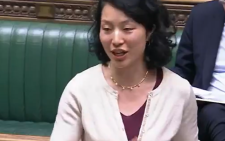Sad, distressed woman regrets sending kin to work in Saudi

When Mariam Mkanjumwa, 26, packed her bags and left the sleepy Mwatunge village in Taita Taveta for Saudi Arabia in pursuit of a better life for her three children in Saudi Arabia, no one stopped her.
If anything, her grandmother, Mama Nancy Wawuda, prayed for her safety in the strange lands she was heading to.
Having endured decades of stinging poverty that condemned them to live under horrendous conditions, the old woman knew fortune and success would never come from sitting idly at home. Six months later, Mama Wawuda thinks she might have made a terrible mistake by letting her granddaughter leave for Saudi Arabia to work as a domestic house help on a two-year contract.
“I just want her back. We do not have much but it is safer here. She needs to come back home. We we will survive with what we have,” Mama Wawuda says.
Huge gaping cracks
Seated on a low kitchen wooden seat inside her ramshackle mud-walled house with huge gaping cracks on some walls and some walls missing, it is easy to understand why work; any kind of work; might have appeared like a godsend for a family that has never known any form of luxury.
Everything inside the house; from crumbling walls, the sparse furniture, tattered clothes dripping murky water on the earthen floor, leaky roof and gaping holes in walls, reeks of poverty and great wretchedness. This was the poverty that Mkanjumwa was fleeing. Tragically, the young woman might have found more misfortunes where she went seeking salvation that makes home look like paradise.
Mama Wawuda says her granddaughter was excited when the offer to work in Saudi Arabia came.
Though the contract terms remain fuzzy, the old woman says her granddaughter reported it would be a two-year contract expected to lapse in 2024.
Mkanjumwa left for Saudi Arabia in April. What followed was laboured communication done through a benevolent neighbour who would bring Whatsapp voice notes to Mama Wawuda to catch up on how her granddaughter was doing. The grandmother has no phone and could only rely on the neighbour’s goodwill.
“She sounded upbeat and hopeful. I kept praying for her,” says the old woman.
Then the tone of the message gradually changed. From being upbeat and hopeful, the sporadic voice notes became gloomy, anxious and even desperate.
By the end of August, it was clear that all was not well. The bubbly Mkanjumwa was not herself. “She was hurting. She sounded so depressed and under a heavy burden. I could sense it,” says the grandmother in subdued tones. In the first three months after leaving Kenya, Mkanjumwa worked on suppressed pay. According to details from a neighbour who was in touch with her, a chuck of salary was deducted to pay for the expenses incurred by the employment agency in facilitating her travel. They included costs of acquiring passport, visa, medical tests and other requirements.
Japeth Righa, the neighbour, says the absence of the contract makes it impossible to know how much was deducted and whether she had agreed to that.
“There is no way to know how much was being deducted from her salary but she was unhappy. She said she wanted to come back home,” Righa says.
Righa adds that details painstakingly patched together reveal Mkanjumwa worked for two employers without significant salary before she was taken back by the agent in Saudi Arabia.
Severe headache
By this time, she had been complaining of working under inhuman conditions including working for long hours and without meals. She had also complained of severe headaches due to the sweltering heat.
Then in September, all communication ceased. Text messages and WhatsApp voice notes sent were never replied to.
“It has almost been a month and there is no word on how she is doing. This is very terrifying because we have seen other girls return to Kenya in terrible condition or even worse,” Righa notes.
He says reports showed her employer worker had even paid for her air ticket from her salary to enable her come home but could not leave because the agent could not let her.
Mama Wawuda says the government should use its influence to bring her granddaughter back home. Her fears are justified by a stranger’s call she received in early September from a Kenyan girl who said she knew Mkanjumwa and had left her at the agent’s holding station.
“The caller said we must do whatever we can to bring her back. She said my granddaughter was in bad shape,” she said.
Documents of Mkanjumwa’s travel show she was recruited by Percific Creative; an overseas recruitment agency. This was the same company responsible for recruiting Diana Chepekemoi; the Meru University student whose plight in Saudi Arabia caused public uproar and forced intervention by leaders that brought her back.
Nelly Chelagat, a domestic worker who was rescued from Saudi alongside Chepkemoi, confirmed that Mkanjumwa had paid for her ticket to return to Kenya but was barred from travelling by her agent.
-KNA












